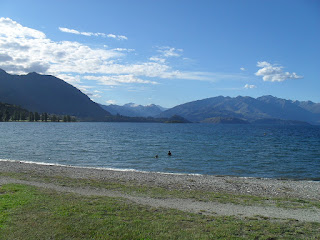With one week of apple thinning behind me, many of my questions about seasonal work have been answered. And I can confidently say that this foray into farm labor has not been a mistake. I found a job almost by accident on my first day of searching in Alexandra, and began work the next day in Roxburgh. The ease of finding full-time work is one major benefit of seasonal employment – hospitality jobs in Wellington were almost always for part-time or casual employees.
I began working within 24 hours of finding the job, after moving from Alexandra to Roxburgh and settling in for an early wakeup the next morning. We spent the first morning filling out pre-employment forms and signing a contract, then began thinning under the supervision of our foreman, a very friendly and understanding guy. Most of my coworkers are internationals like me, with a few Kiwi students there for the summer (I'm still getting used to December being the summer). The largest groups seem to be Germans, Czechs, and South Americans – primarily Argentinian, with a few Uruguayans and Chileans in the mix. The first thing our foreman said was, “how is everybody's English?”
Since then, it has been 40 hours of the most repetitive work I've ever done. Thinning simply means reducing the fruit on the trees to allow the remaining apples to grow to full size. It is amazing how many discussions can be had about various thinning techniques, but none of them seems to eliminate the problem of sore thumbs. Much like the callouses built by playing guitar, however, the thumbs eventually toughen up and now I hardly notice as I thin 60 small trees per day. My coworkers spend much of the day with headphones on, but I prefer to let my mind wander, which can hardly be avoided when doing such mundane work.
Once I overcame the initial hurdles of changing my routine and building a thumb callous, I've come to my own set of conclusions about seasonal farm work. Many people arrive with illusions of working hard and making tons of money, but the prices per tree are designed so that workers make minimum wage. My biggest frustration has been the lack of transparency about the prices, which is such that I may have done 50 trees before learning their price. I even worked a full day unaware that the price of the trees I was thinning had dropped because we were working too quickly. However, the law guarantees us minimum wage every day, and the long hours mean I will certainly be able to save some money no matter how fast I am (they also ensure that I have little energy to spend money elsewhere). I had also been concerned about the intensity of the job, something everyone mentions. It's lucky I'm doing thinning rather than harvesting, as it requires no lifting. While certainly physical labor, I return from work in a gratified state of fatigue, rather than in serious pain. Sleeping has never been so easy.
There's one more hurdle I've had to overcome – being surrounded by fellow travellers. Although I spent plenty of time with foreigners in Wellington, many of them were English speakers, and I spent at least 50% of my time with Kiwis. Seasonal farm labor, logically, seems to attract non-native speakers of English, as it doesn't require them to speak it. It has been quite a change to be in the minority as a native speaker of English, and to hear New Zealand spoken of as a place to visit rather than as a place to live. In the end, of course, I am just a visitor, but I've always preferred to live abroad, rather than just be abroad. I can dream, can't I?
This job lasts for another three weeks, and I'm still formulating plans for Christmas and New Year's. More than likely, they will not involve being anywhere with a tree and presents, and certainly not with snow. Regrettably, I have not taken any photos of my new job, but I can promise you, it looks much better than the inside of an office.
















































